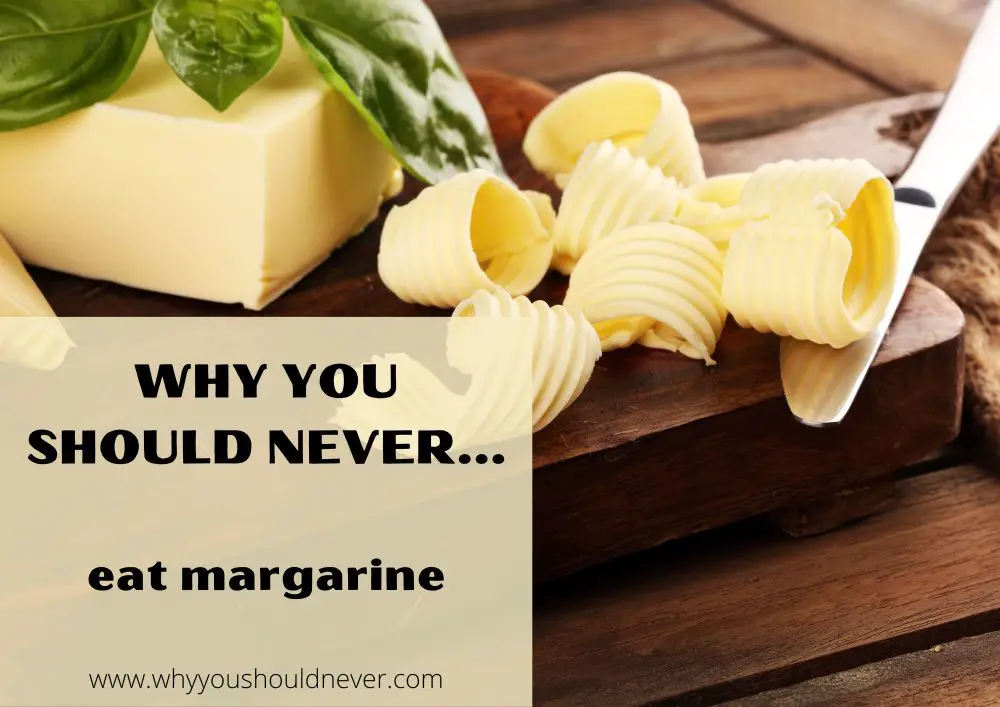![]()
Why You Should Never Eat Margarine
Margarine has been a popular substitute for butter in many households for decades. It was first created as a cheaper and more readily available alternative to butter, which was once considered a luxury item.
Margarine is made from vegetable oils that are hydrogenated to create a solid texture, while butter is made from churned cream.
However, as with many processed foods, there are several reasons why you should think twice before consuming margarine, which we’ll discuss below.
7 reasons why you shouldn’t eat margarine
1. Margarine is full of trans fats
Trans fats are a type of unsaturated fat that can have negative effects on cholesterol levels and heart health. Margarine is made by hydrogenating vegetable oil, which turns it into a solid spreadable form, but the process also creates trans fats in the product.
While some margarines may claim to be “trans-fat-free,” they can still contain small amounts of these harmful fats.
2. It’s highly processed
Margarine goes through extensive processing to create its smooth texture and long shelf life – processes which include bleaching agents and chemical solvents like hexane or heptane, both of which have been linked to negative health outcomes.
3. It’s low in nutrients
Unlike butter or other natural spreads like avocado or nut butter, margarine contains few if any nutritional benefits beyond calories from fat. So, you might think that you’re reaching for a healthier substitute for butter, but you’re really just consuming empty calories.
And while some margarine is fortified with vitamins A and D, these are added during the manufacturing process and may not be absorbed as effectively by the body as when they occur naturally in food.
4. It’s often loaded with artificial ingredients
To make up for its lackluster taste compared to real butter (which is derived from milk), manufacturers often add artificial flavorings, colorings, and preservatives to margarine. These additives can have negative health effects in the long run.
5. It’s not a whole food
Margarine is a highly processed product that doesn’t occur naturally in nature. Whole foods like fruits, vegetables, and nuts provide essential nutrients for our bodies to function optimally – margarine does not.
Say what you want about real butter, but it’s a whole food that comes from natural sources. It contains essential nutrients like vitamins A, D, and E, as well as saturated fat which is necessary for brain function and hormone production.
6. You can’t cook with it the same way you can with butter
Margarine has a lower smoke point than butter, meaning that it can burn more easily when heated. This makes it difficult to use for frying or baking at high temperatures.
If you’ve ever tried to make toffee with margarine, for example, you’ll have noticed that the water content in the margarine causes it to separate and ruin the end product.
Butter, on the other hand, has a higher smoke point and can be used in a wider variety of cooking techniques.
7. It just isn’t butter
While margarine may seem like a cheaper and healthier alternative to butter, it simply can’t compare in terms of taste and texture. The rich flavor and creamy texture of real butter simply can’t be replicated by processed spreads that lack natural fat.
Wrapping things up
Most things are fine in moderation, and the same can be said for margarine.
However, when considering the health risks and negative impacts on taste and texture, it’s clear that butter is a better choice overall.
Yes, margarine may be lower in saturated fat than butter and suitable for vegan diets, but it often contains unhealthy trans fats which can increase your risk of heart disease.
Where possible, though, try to limit your consumption of both butter and margarine, and opt for healthier fats like olive oil or avocado when cooking. And if you’re going to indulge in a little bit of butter, remember that it can be enjoyed guilt-free as part of a balanced diet.
